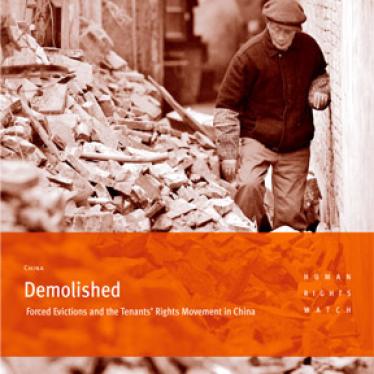(Hong Kong) - Chinese local authorities and developers are forcibly evicting hundreds of thousands of homeowners and tenants who have little legal recourse, Human Rights Watch said in a report released today.
Evicted residents left with few avenues of redress have increasingly taken to the streets to protest, where they have met police repression. In many cities, evicted residents have begun organizing street protests and posting grievances on the Internet. Senior legal experts and even some government-controlled news media have openly criticized the government's failure to protect the rights of homeowners and tenants. The Chinese government has recently passed some legal reforms, including a constitutional amendment to protect property rights that was adopted this month by the National People's Congress.
"People are having their homes taken out from under them," said Sara Davis, a China researcher at Human Rights Watch's Asia Division. "On paper, the new constitutional amendment may provide some protection, but these words need to be translated into action."
Human Rights Watch said that China's rapid urban development, fueled in Beijing by preparations for the 2008 Olympics, is leading to the eviction of homeowners and tenants in violation of Chinese law and international standards on the right to housing.
The 45-page report, "Demolished: Forced Evictions and the Tenants' Rights Movement in China," details the problems many Chinese citizens face.
"Victims are sometimes evicted by hired thugs or have their homes knocked over by bulldozers while they are asleep in bed," said Davis. "Instead of enforcing existing laws, local officials do little to stop illegal practices and in fact often benefit financially from close association with the developers."
Developers often work with local government officials to request and implement forced evictions. Widespread corruption can lead Communist Party officials to favor the interests of developers over those of residents. Courts often refuse to hear eviction cases because of pressure by local officials. As a result, people who challenge their eviction cannot properly pursue their claims through arbitration or in court. Where residents do receive compensation, it is often inadequate. Human Rights Watch said that national legal reforms have had minimal impact in reversing this situation.
In October, Shanghai courts sentenced lawyer Zheng Enchong, a prominent advocate for the rights of tenants, to three years in prison for "circulating state secrets" after he sent faxes about local protests to a U.S.-based human rights group. Since his jailing, lawyers and tenants have told Human Rights Watch that fewer lawyers are willing to take on forced eviction cases.
"The Chinese government wants evicted residents to take their problems to court instead of taking them to the streets," Davis said. "But the court system must be strengthened and made more independent. Lawyers like Zheng should be consulted on the needed reforms, not jailed."
Accounts from Demolished: Forced Evictions and the Tenants' Rights Movement in China
"In the beginning, [developers] tried to sway their hearts. They said, 'If you move, you will get good compensation.' Then after the meetings did not get anywhere, they turned to stronger methods. In the middle of the night, while they were sleeping, people came in and broke up the courtyard wall. There were lots of people living there together in this building, they had a shop, it was really dangerous, there were still people living there."
--"Zhang," friend of a forcibly evicted Beijing family
"They forcibly demolished my home when there was no one at home. When we returned home, my home was gone. My home was flattened, and turned into ruins. We did not know where our belongings were."
-- Tenants' rights advocate Xu Yonghai in an interview with Australian ABC. Xu is currently in jail awaiting trial on charges of "circulating state secrets"
"The demolition and eviction management department came to say they had only two days to move before forced demolition. The government department did not approach them and offer an agreement. [My parents] didn't get any [compensation], and they had no help with resettlement."
--"Kong," whose parents were forcibly evicted in Beijing
"It is precisely the intervention of civil authorities, their defiance of the law, and their wanton use of forced eviction that are subverting the constitution and the national rule of law, and undermining the long-term peace of society."
--Editorial, China Economic Times, November 26, 2003







